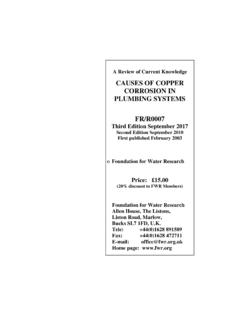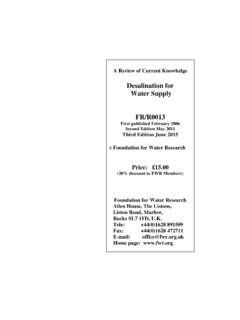Transcription of 04 01 Incidents and their classification: the …
1 Doc No 04_01 Version 9 Last printed 25/02/14 Page 1 of 60 What is this about? This document describes what an incident is and the two-tier system we use to classify Incidents ; the Common incident classification Scheme (CICS). The first tier measures our physical response in dealing with the incident . The second tier describes the actual impact the incident has on the environment. Who does it apply to? All staff who classify Incidents , in order to determine our response ( Competent officers ), and all staff who record the actual environmental impact of the incident , including: Environment Management duty officers; Environment Officers, EPR and regulatory officers; RSR-Duty Tactical Managers; Fisheries officers; Drought co-ordinators; Waterways Operations team leaders; Flood incident Duty Officers; Flood Warning Duty Officers; Operations Delivery Field team leaders and Specialist team members; Flood incident Management teams.
2 Important!: The Introduction, CICS Tier 1 and CICS Tier 2 sections are relevant to all functions. After you are familiar with this section, refer to your relevant functional section: Environment Management Incidents Fisheries Incidents Water Resources Incidents Waterways Incidents Flood and Coastal Risk Management Incidents . You can share this document with external organisations, such as water companies, provided you also state that it is only correct at the time of printing. Document details Related documents Feedback Contact for queries Incidents and their classification : the Common incident classification Scheme (CICS) Operational instruction 04_01 Issued 30/09/2011 Doc No 04_01 Version 9 Last printed 25/02/14 Page 2 of 60 Contents Introduction 3 Definition of an incident 3 incident record 7 Categorisation of Incidents 8 CICS Tier 1 9 Impact on resources 9 CICS Tier 2 12 Impact on the environment 12 Impacts on nature conservation sites and species 13 Environment Management (air, land and water)
3 Incidents 16 Impact on air 19 Guidance when assessing impact from noise 23 Guidance when assessing impact from odour 25 Impact on land 26 Impact on water 29 Impact on water quality 31 Impact on potable abstractions 33 Impact on nature conservation (water) 33 Impact on human health 36 Impact on amenity value 37 Impact on agriculture/commerce 38 Fisheries Incidents 39 Water Resources Incidents 44 Waterways Incidents 49 Flood and Coastal Risk Management Incidents 53 Consent infringements and enforcement 54 Flooding Incidents 54 Environmental impact of FCRM Incidents 57 Related documents 60 Doc No 04_01 Version 9 Last printed 25/02/14 Page 3 of 60 Introduction Definition of an incident Definition For Environment Agency purposes, an incident is.
4 A specific event, which is brought to our attention, and is within our areas of responsibility and which may have an environmental and/or operational impact. Definition - explanatory notes An incident is a specific event or occurrence, not an ongoing situation of which we are already aware (see ongoing events/known problems). An incident can either happen in a single location or in multiple locations at the same time or sequentially (such as flooding). Such events are brought to our attention through reports from members of the public, emergency services, local authorities, other regulators, industry, Environment Agency staff and other parties.
5 Incidents within our area of responsibility, that have a potential or actual environmental impact, include reports of: environmental harm/pollution of surface waters or groundwater; environmental harm to land, air and water from an activity or substance we regulate; human health impacts and amenity nuisances from an activity or substance we regulate; major air pollution Incidents where we co-ordinate the monitoring and modelling; fish kills and illegal fishing; damage to nature conservation sites and species from activities we regulate; illegal abstraction and low river flows; speeding vessels and closure of a navigation fairway; flooding or potential causes of flooding; habitat and hydromorphological damage from land drainage works.
6 The incident does not actually need to result in an environmental impact, as our actions may prevent damage occurring. The incident may have been caused by our own workforce, or by contractors operating on our behalf. Alarms from our telemetry/ automated equipment Record an event leading to the generation of an alarm, from Environment Agency telemetry or other automatic equipment, as an incident if we need to deploy non-routine resources to investigate or respond. This includes automated recordings of high flows and low dissolved oxygen, and operational telemetry alarms indicating flooding or an imminent potential for flooding.
7 Doc No 04_01 Version 9 Last printed 25/02/14 Page 4 of 60 Analytical failures Record a retrospective analytical failure as an incident where the investigation reveals an ongoing polluting problem, or there is evidence of an environmental impact. This includes both results from our sampling and self-reporting from industry. For example, only record bathing water sample exceedances as Incidents if the subsequent investigation reveals evidence of an event at an identified source, such as a combined sewer overflow (CSO). Failing a mandatory directive doesn t automatically mean a Category 1 or 2 incident , but is likely to.
8 We must also consider the actual impact on water quality, the status of the water body, and other impact criteria. Operator ( self ) recorded/ reported events A permit, consent, or local agreement, may require an operator to notify us of alarms and emissions. Operators may also be required to keep records of any emissions and actions taken to comply with the permit, and submit them to us or make them available for inspection. Record these as Incidents where the investigation reveals an ongoing polluting problem, or there is evidence of an environmental impact. Works undertaken to address minor nuisance issues which have not resulted in environmental impact will not normally be Incidents .
9 For example, a record of litter outside a site which has been collected or mud on the road which has been cleaned up. The majority of notifications of emission limit values being exceeded from installations do not have any environmental impact as the permit is based on best available techniques (BAT) or appropriate measures/cost benefit. Historically, self-notification of breaches of emission limit values by operators results in few Incidents . Refer to Operational instruction 16_02 for how to record operator-reported failures and technical breaches related to plant, equipment and UV failure. Record breaches of authorisation/licence conditions under the Compliance classification Scheme.
10 Breaches of legislation, permit limits, and illegal activity Record a breach of regulation or permit limit and illegal activity as an incident if it is having, or about to have an environmental impact if some form of immediate preventative action is not taken. For example: An unbunded oil tank on a permitted site would not be an incident unless it was leaking and causing or likely to cause pollution. A breach of a flood defence consent would not be an incident unless an environmental impact was actually taking place, or action was required to prevent an imminent impact (see consent infringements).









